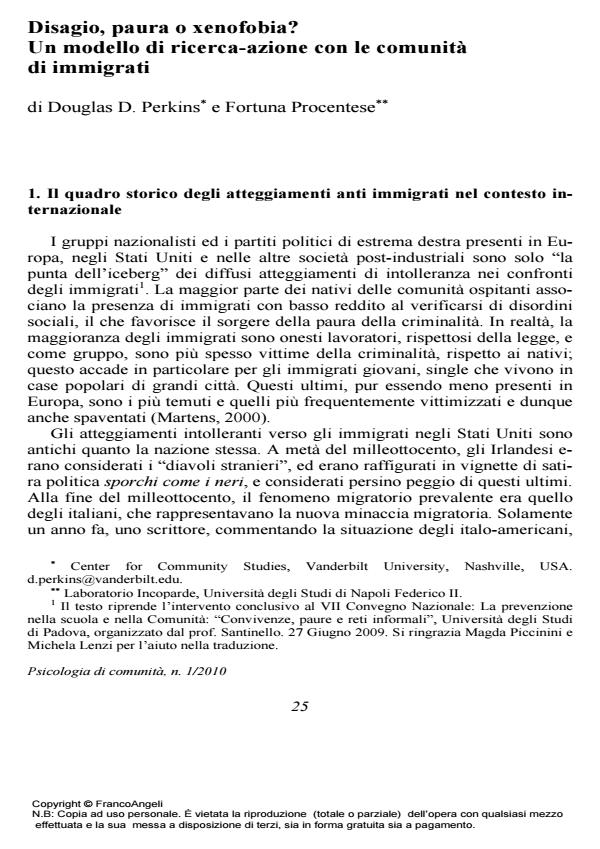Perceived Disorder, Fear or Xenophobia? A Comprehensive Model for Action Research on Immigrant Communities
Journal title PSICOLOGIA DI COMUNITA’
Author/s Douglas D. Perkins, Fortuna Procentese
Publishing Year 2010 Issue 2010/1
Language Italian Pages 15 P. 25-39 File size 1182 KB
DOI 10.3280/PSC2010-001003
DOI is like a bar code for intellectual property: to have more infomation
click here
Below, you can see the article first page
If you want to buy this article in PDF format, you can do it, following the instructions to buy download credits

FrancoAngeli is member of Publishers International Linking Association, Inc (PILA), a not-for-profit association which run the CrossRef service enabling links to and from online scholarly content.
Historical and contemporary anti-immigrant attitudes and policies in the U.S. and Europe are reviewed. Natives in host communities associate low-income immigrants with social disorder and thus with increased risk and fear of crime. But most immigrants are hard-working, law-abiding, and are more often victims of crime than are natives. The developed world has benefited from immigration from less developed countries but has practiced policies of forced acculturation and social exclusion. Research on immigration is on the rise, but has barely begun to focus on policy and other macro-societal influences, political acculturation, and host community responses to immigration. A comprehensive ecological model, adapted from Christens and Perkins (2008), is presented to guide action research on immigrant communities at multiple levels and focusing on the socio-cultural, physical, economic, and political environment. We must turn xenophobia into xenophilia, or the love, appreciation and strength of diversity.
Keywords: Anti-immigrant bias, immigration policy research, oppression, liberation, empowerment, wellness.
- Psychosocial Studies of Migration and Community: Introduction to the Special Issue Douglas D. Perkins, Neal A. Palmer, Manuel García-Ramírez, in Psychosocial Intervention /2011 pp.237
DOI: 10.5093/in2011v20n3a1 - Schede bibliografiche Caterina Arcidiacono, in PSICOLOGIA DI COMUNITA' 1/2018 pp.119
DOI: 10.3280/PSC2018-001008
Douglas D. Perkins, Fortuna Procentese, Disagio, paura o xenofobia? Un modello di ricerca-azione con le comunità di immigrati in "PSICOLOGIA DI COMUNITA’" 1/2010, pp 25-39, DOI: 10.3280/PSC2010-001003